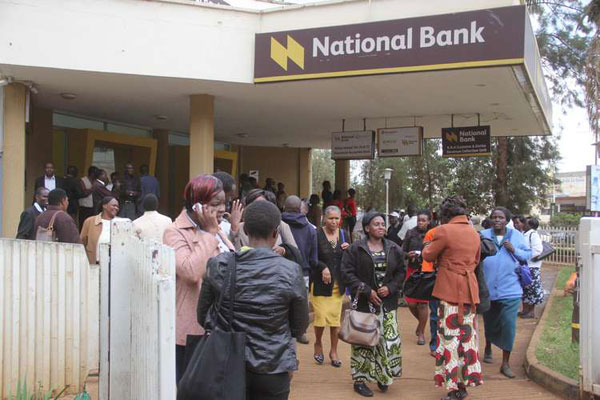Kenya Commercial Bank (KCB) has put on the table an offer to buy the troubled National Bank of Kenya, according to. If successful, a merger of two of the largest state-controlled banks, would result in Kenya’s biggest bank by assets, branch network and even profitability.
Both National Treasury and KCB’s management have not spoken about the proposal, but the Sunday Nation revealed yesterday that KCB has formally approached the National Treasury and the National Social Security Fund, the major shareholders of NBK, with a written proposal.
The backers of the proposal say an acquisition by a stable bank like KCB would be the government’s best shot at finding a lasting solution to the perennial problems at National Bank.
KCB proposes to acquire a minimum of a 70% stake in NBK’s issued capital through a share swap, which means KCB will not have to pay for the shares in cash, according to the Sunday, quoting documents seen by its reporter.
See Also: GoK’s cashless rescue package for Kenya Airways
Under the deal, the National Treasury, NSSF and other significant minority shareholders of NBK be issued with KCB shares in exchange for NBK shares based on the market valuation of both banks.
After the share swap, the National Treasury and NSSF’s collective ownership in KCB will increase from 23.6% to over 30%, giving the state a bigger say in the corporate governance of the largest commercial bank in Kenya and in the region.
Technically, the entity buying NBK is KCB Group, the holding company, which in the initial stages, will temporarily manage and operate two separate brands: KCB and NBK.
In the second phase, the plan is to merge the two banks into one large bank, inevitably leading to closure of several unprofitable branches and staff layoffs at the NBK.
According to KCB’s estimates the merger process may entail closure of 50% of NBK’s 78 branches. In the third and final phase, it is proposed that KCB will acquire the 30% of NBK shares in the hands of the public.
In terms of cost, KCB has estimated that branch closures and staff layoffs will amount to Ksh2.8 billion. Buried in the fine print of the proposal by KCB is a request to the government to introduce an arrangement whereby 80 to 90% of all government deposits, accounts and banking business in other banks will be closed and everything centralised into a so-called “treasury single account” at KCB. This will effectively put KCB ahead of its peers in the fight for the lucrative government banking business and deposits.
NEXT: Mumias Sugar gets an acting CEO
KCB says that if its proposal to acquire NBK goes through, it will be in a position to swallow two of the other state-controlled troubled banks: Consolidated Bank of Kenya and Development Bank of Kenya.
Over the years, NBK has gone through a series of bailout programmes, none of which has proved sustainable. NBK has recently returned to familiar territory of poor financial performance.
The non-performing loan portfolio, at 32 per cent, is one of highest in the banking sector. In 1998 the bank experienced a run occasioned by liquidity problems forcing the Treasury and NSSF to bail out the bank to the tune of Sh4.5 billion and Sh1.1 billion respectively.
These shareholders were converted to preference shares in 2003. In 2006, the Cabinet approved another massive bailout of the bank through the issue of Sh21 billion in Treasury bonds, ostensibly to repay general government indebtedness. Since 2012, it has unsuccessfully tried to do a rights issue.
[crp]













Leave a comment